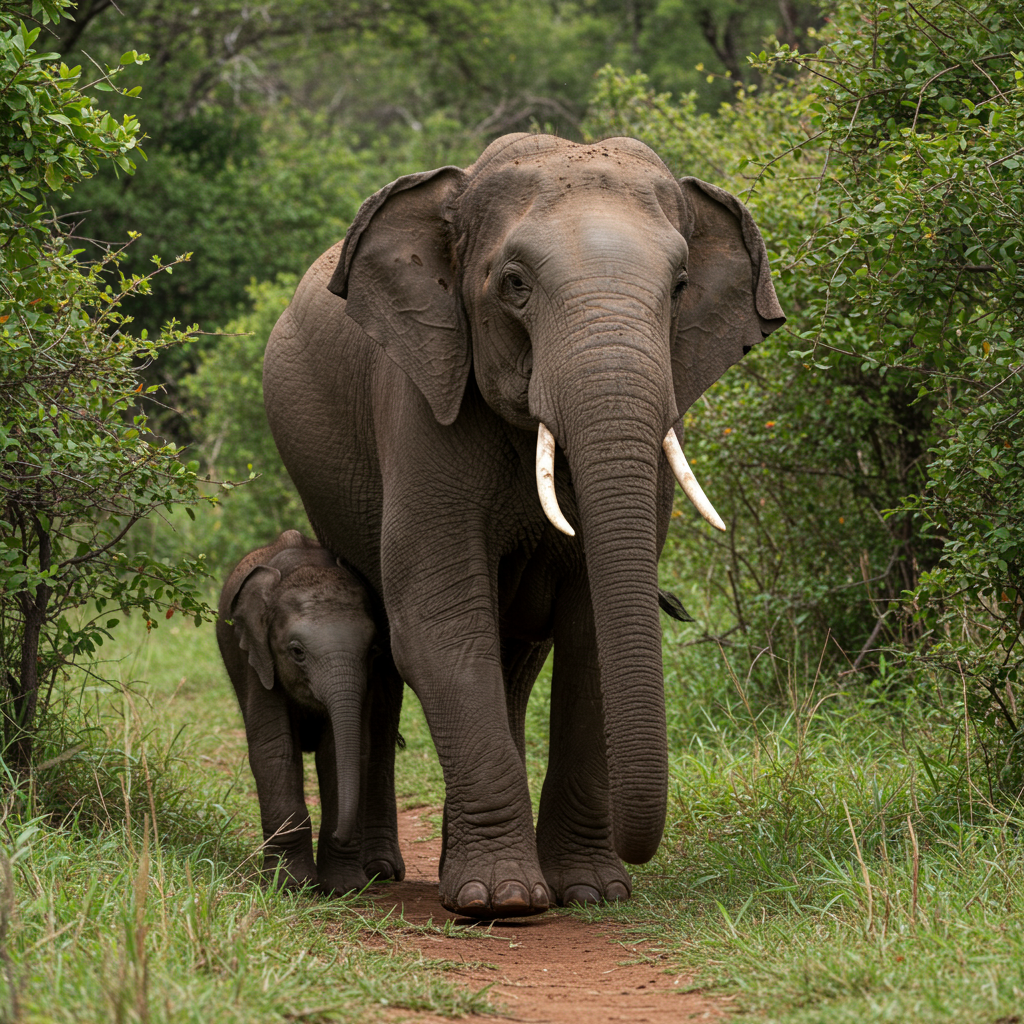A tragic wildlife encounter in zambia’s South Luangwa National Park has resulted in the deaths of two elderly female tourists during a walking safari. Authorities have confirmed that a British woman and her New Zealand companion were fatally attacked by a female elephant accompanied by her calf on Thursday, July 3, 2025. This devastating incident highlights the inherent risks involved in close wildlife interactions, even under guided supervision in protected areas. Police are investigating the full circumstances surrounding the charge, which occurred as the group navigated the park’s terrain near a river crossing point.
The victims were identified by Eastern Province Police Commissioner Robertson Mweemba as 68-year-old Easton Janet Taylor from the United Kingdom and 67-year-old Alison Jean Taylor from New Zealand. Both women were participating in a guided walking safari, a popular activity in South Luangwa known for offering an immersive bush experience. The attack happened around 6:20 local time.
Fatal Encounter Details Emerge
Reports indicate the group was on foot when they encountered the elephant. The animal, a female, had a young calf with her. Female elephants are renowned for their strong protective instincts towards their offspring. Any perceived threat can trigger aggressive behavior, including charging. In this instance, the elephant reportedly charged directly at the two women.
Guides accompanying the safari group attempted to intervene. They fired shots at the elephant in an effort to deter its attack. The animal was hit and sustained wounds from the gunfire. However, despite the guides’ attempts to stop the charge, they were ultimately unsuccessful. Both Easton Janet Taylor and Alison Jean Taylor sustained severe injuries and died at the scene of the attack. Police noted the victims suffered fractured limbs and deep cuts during the stampede.
The incident occurred within the vast South Luangwa National Park. This prominent park in eastern Zambia is located approximately 600 kilometers (about 370 miles) northeast of the capital city, Lusaka. The park is celebrated globally for its abundant wildlife and is a key destination for walking safaris.
Protective Mother Elephants and Risky Encounters
Wildlife experts and safari operators consistently emphasize the unpredictable nature of wild animals. Elephants, particularly mother elephants with calves, can be highly dangerous if they feel threatened. Their immense size and speed make a charge difficult to escape or stop once initiated. Safari guides are trained to read animal behavior and manage encounters, often being armed for protection. The presence of armed wildlife officers with the group underscores the recognized risks.
This recent tragedy is not an isolated event regarding fatal elephant encounters in Zambia. It follows other serious incidents involving tourists in the country.
Last year, two separate fatal attacks occurred involving American tourists. Both victims were also elderly women, though those incidents happened while they were inside safari vehicles, not on foot.
One such case involved 64-year-old Juliana Gle Tourneau from New Mexico. She was killed in June of the previous year near Livingstone, Zambia. Reports stated her group’s vehicle stopped near the Maramba Cultural Bridge due to traffic caused by a herd of elephants. Tourneau reportedly left the vehicle, a clear breach of National Park regulations, and was subsequently attacked, thrown, and trampled by an elephant.
Another tragic incident last year saw 79-year-old Gail Mattson from Minnesota lose her life in Kafue National Park. An elephant charged the safari truck she was in, causing it to flip over. Mattson died, and five other occupants of the vehicle were injured. Her daughter touchingly described her mother as being on her “dream adventure” at the time of the tragedy, highlighting the devastating impact such events have on families.
Global Context of Wildlife Tourism Risks
Fatal wildlife encounters are not confined to Zambia. Just two months prior to the South Luangwa incident, a 68-year-old woman was killed in South Africa’s Kruger National Park. That victim was trampled by a herd of elephants with calves after leaving her accommodation at night and walking onto a dark road. CCTV footage reportedly captured this event.
Earlier the same year, in January, a 22-year-old Spanish student, Blanca Ojanguren García, died in Thailand. She was killed by an elephant named Clarín at an elephant care center while participating in bathing the animal. The elephant reportedly attacked her with its tusk.
These incidents serve as somber reminders that interacting with wild or semi-wild animals, even in seemingly controlled environments or with guides, carries inherent dangers. While millions enjoy safaris and wildlife tourism safely each year, the potential for unpredictable animal behavior remains a critical factor.
Walking safaris, while offering unique proximity and sensory experiences, inherently place participants in closer proximity to potentially dangerous animals than vehicle-based safaris. This requires exceptional vigilance, adherence to guide instructions, and an understanding that even trained guides cannot always prevent an animal charge.
The Zambian authorities, including the police and wildlife management agencies, are expected to conduct thorough investigations into the South Luangwa incident. These investigations typically examine guide protocols, group positioning relative to the animal, and the specific circumstances leading to the charge. The outcomes often inform future safety guidelines and training for safari operators and guides in the region.
Tour operators play a crucial role in managing risks. They are responsible for employing experienced guides, ensuring adherence to park regulations, and conducting comprehensive safety briefings for clients. Tourists undertaking such trips are advised to follow all instructions from their guides meticulously and remain aware of their surroundings at all times. Understanding animal behavior and respecting their space, especially when calves are present, is paramount.
The tragic deaths of Ms. Taylor and Ms. Taylor underscore the delicate balance between human tourism and wildlife conservation. While national parks offer incredible opportunities to witness nature, they remain wild environments where animals behave according to instinct, not human expectations.
Frequently Asked Questions
What happened during the fatal elephant attack in Zambia?
On July 3, 2025, two elderly female tourists, Easton Janet Taylor (68, UK) and Alison Jean Taylor (67, New Zealand), were killed by an elephant during a walking safari in South Luangwa National Park, Zambia. A female elephant with her calf charged the group. Guides attempted to deter the animal by shooting it, but were unsuccessful. Both women died at the scene from injuries sustained during the attack.
Where did the fatal elephant attack occur in Zambia?
The deadly incident took place in South Luangwa National Park, located in eastern Zambia. The park is situated approximately 600 kilometers (370 miles) from Zambia’s capital, Lusaka. The specific location within the park was near a river crossing point the group was approaching during their guided walking safari.
How common are fatal elephant encounters involving tourists in Zambia?
While rare relative to the number of safaris conducted, fatal elephant encounters involving tourists do occur in Zambia. This incident follows two separate fatalities involving American tourists in Zambia last year (2024). In those cases, the tourists were in safari vehicles when attacked, contrasting with this walking safari incident. Other fatal encounters have also been reported in nearby regions and countries.
Conclusion
The deaths of Easton Janet Taylor and Alison Jean Taylor in South Luangwa National Park represent a profound tragedy. Their fatal encounter with a protective mother elephant serves as a stark reminder of the inherent risks present when exploring wild environments. While safari experiences offer unparalleled connections with nature, they demand constant vigilance, strict adherence to expert guidance, and a fundamental respect for the power and unpredictability of wildlife. Authorities will continue to investigate this specific event, contributing to ongoing efforts to enhance safety protocols for both visitors and residents in areas shared with dangerous animals like elephants.




